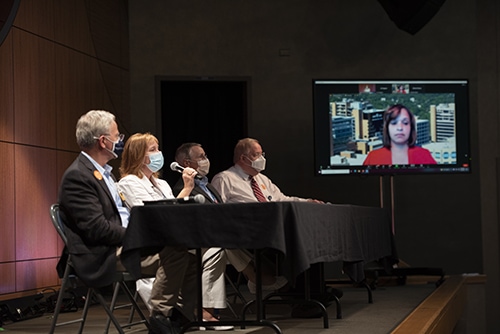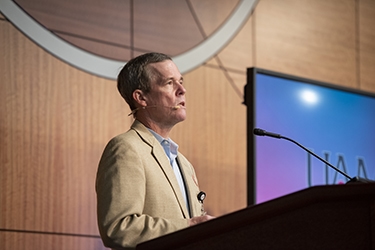Expert Panel Answers COVID-19 Questions at Chancellor’s Town Hall
| A Town Hall panel gathered July 28 to answer questions from the online audience about COVID-19 featured familiar faces.
More than six months after a similar Town Hall meeting in January at UAMS, the tone and tenor of the July panel was even more serious and concerned as Arkansas and other states experience a surge caused primarily by the delta variant, a mutation not widely circulating in early 2021.
However, the essential message was the same as January’s: vaccinate. Hesitancy among a segment of the population about receiving the vaccine is cause for new worries, panel members said.

Michelle Krause, second from left, answers a question at the town hall. The other panelists were Steppe Mette, left, Krause, Robert Hopkins Jr., James Graham, and Danielle Lombard-Sims, on screen.Image by Evan Lewis
“I tell some of my patients that you will wish you could choose to have the COVID from last year because you really don’t want the COVID from this year,” said Michelle Krause, M.D., MPH, professor in the Division of Nephrology in the UAMS College of Medicine Department of Internal Medicine. “Just go ahead and get vaccinated because you are choosing either the vaccine or you’re choosing hospitalization, disability or death. That’s the real decision.”
Krause was one of four physicians on the panel that also included Steppe Mette, M.D., UAMS Medical Center CEO and senior vice chancellor of UAMS Health; Robert Hopkins, M.D., professor and division director of General Internal Medicine and chair of the National Vaccine Advisory Committee to the U.S. Department of Health & Human Services; and James Graham, M.D., College of Medicine executive associate dean for academic affairs.
Chancellor Cam Patterson, M.D., MBA, opened the meeting by saying thank you to UAMS employees and staff.
“It’s been hard. It’s been hard for all of us,” Patterson said. “Many of you are working harder, longer and taking care of more patients. You’re doing work that you didn’t use to do. We thank you for that, but we also know that our resiliency is not unlimited. We want to be sure that we are taking every opportunity to hear from you.”
Because of the low vaccination rate in Arkansas and the higher transmissibility of the delta variant, the state and UAMS both are experiencing a surge in new COVID-19 cases and hospitalizations, Mette said. When patients are infected, they also are getting sicker.

Chancellor Cam Patterson speaks at the July 28 town hall meeting.
Early in 2020, UAMS suspended elective surgeries, which freed up some staff to care for infected patients. Although UAMS has cut back on some inpatient elective procedures, the cuts are not as sweeping as before, so the availability of staff for reassignment is much more limited.
Mette said the good news is the knowledge and expertise of clinical staff in treating patients with COVID-19 is much higher than a year ago, and a higher percentage of patients are recovering. For example, monoclonal antibody treatment is proving effective for patients who already are infected and in a high-risk category.
Hopkins said the newly infected patients are younger and sicker and that “unfortunately, children are one of the groups being infected with the delta variant. Our colleagues at Arkansas Children’s are seeing more COVID patients there than they have ever had.”
Many of the answers from the panel addressed specific fears and fallacies about COVID-19 vaccines.
Krause said no evidence exists from vaccine trials or in published findings that the vaccines are harmful to pregnant women and their babies. Instead, they are at a high-risk of COVID infection and hospitalization. In another plus for vaccination, she said, a vaccinated, pregnant woman may pass on the antibodies from the vaccine through the placenta to the baby.
Similarly, Hopkins said vaccines do not cause infertility in men or women, and one study has shown they even may slightly increase male fertility.
Vaccine booster shots that might add to protection against variants of the virus are in development now but have not yet been approved for use.Clinicians are awaiting guidance from the Centers for Disease Control and Prevention about boosters.
Despite the benefits of the vaccines, vaccinations are not mandatory at UAMS. The chancellor explained that as a state entity the university cannot require them without permission from the Arkansas Legislative Council. UAMS is in frequent communication with legislators about the need for that permission and may seek that exception in the coming weeks, Patterson said.
About 85% of COVID-19 patients in the UAMS Medical Center were not vaccinated. The remainder were vaccinated but had compromised immune systems or underlying health conditions that made them vulnerable to infection, Krause said.
In regard to the coming academic year, Graham said more than 85% of students have been vaccinated. While still masking, social distancing and taking all other precautions in classrooms and lecture halls, in-person instruction is expected to resume in August.
How do you convince someone who is hesitant about getting vaccinated to get it?
“We have three safe and effective vaccines available,” Hopkins said. “Yes, there are some very uncommon side effects, but those shouldn’t be high on your list of worries. I worry much more about you getting COVID.”
Between 10% to 30% of people with COVID-19, including those with mild symptoms, may develop prolonged syndrome that can include neurological complications, cardiovascular complications and others.
“I don’t want to see anyone disabled for life for something that we could prevent with a vaccine,” Hopkins said.
